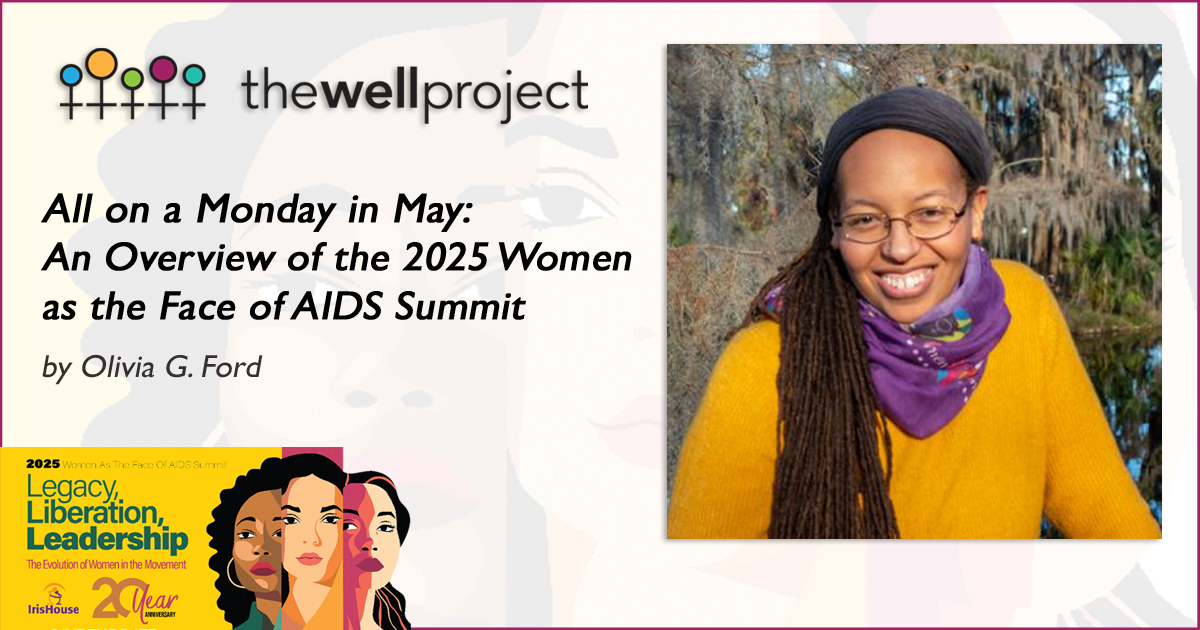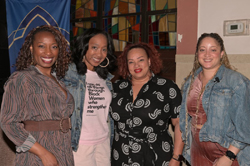
By Olivia G. Ford
You can set your yearly clock by it: The first Monday of each May draws a crowd of HIV community advocates, service providers, clinicians, and other leaders from across the region to East Harlem, New York City, for Iris House's annual Women as the Face of AIDS Summit. As with nearly every year of the summit so far, members of The Well Project team were in attendance – and in celebration of this year's milestone of 20 years since Iris House first convened this powerful gathering.
Personally, I have lost count of the number of years since 2008 (my first Summit) that I have come to this space to cheer for honorees, attend or present workshops, take in tailored updates on the HIV epidemic among women and girls from renowned experts in the field, meet new collaborators, and catch up with longtime comrades. I've made it to at least ten.

On the morning of the 20th annual Summit, the opening plenary included a special performance of "Not To Be An Alarmist, But ..." a one-act play authored by The Well Project's stakeholder liaison, the ever-creative Bridgette Picou, LVN, ACLPN. Bridgette wrote this captivating work last year as part of playwright and activist Donja R. Love's seminal Write It Out! program; the 2024 cohort's plays debuted in New York City on December 2, so this was the play's second NYC staging. Bridgette was in town from California and took the stage after the play for a candid conversation with the two actors and the director who brought "Alarmist" to life. Writer, scholar, and activist Ted Kerr also related some key moments of the play, and the plenary, in a piece for POZ Magazine about the Summit.
View the opening plenary session video below - "Not To Be An Alarmist, But ..." begins at 17:25
The afternoon breakout sessions featured back-to-back workshops by our team members. "Bridging Generations: Healing and Empowerment in Women Living with HIV" brought Bridgette together with The Well Project community advisory board member Kim Canady of Conversations with Kim for a discussion unpacking the unique, and overlapping, experiences of older women living with HIV and lifetime HIV survivors. I encourage you to read Bridgette's recounting of her experience presenting with Kim and the importance of making intergenerational connections.
Sadly, my first session that afternoon ran during the same time slot as Bridgette and Kim's; while I regretted not being able to be in two places at once, I was glad to co-present the session "What's Your Role? Communicating and Connecting with Black Women about Sexual Health," with HIV specialist pharmacist Alftan Dyson, wearing my "hat" as a member of the Black Women's Working Group to Reframe Risk, convened by ViiV Healthcare. The session explored the importance of using language rooted in agency and values in HIV care and prevention, including shifting from the stigmatizing notion of "HIV risk" to the more affirming reasons for HIV prevention. On the theme of the passing of time, I cringe at some of the HIV-related language that was in common use in 2007 when I started out as an editor at TheBody that advocates, including The Well Project, have since pushed to amend. I have also been an out lesbian for more than 25 years and had a front-row seat to a pocket dictionary's worth of shifts in what is considered acceptable and affirming language to describe the LGBTQIA+ community and the circumstances surrounding it. The bottom line is: Language can and does change. "Risk" terminology has been long overdue for the chopping block, and it is a thrill to get to participate in conversations about community-driven alternatives.
After that first session, I sprinted down the hall to co-facilitate "Empowering Choices: Updated Guidelines on Breastfeeding for Parents Living with HIV" with The Well Project director of programs Ciarra "Ci Ci" Covin. It always charges me up to present with Ci Ci, and I have had the luck and honor of presenting with her many times in multiple US states on various dimensions of this topic. Not only is Ci Ci the premier subject-matter expert on the topic of breast/chestfeeding, advocacy, and HIV in the US, from whom I always learn something; but also, I just genuinely enjoy doing any kind of work with her. When it comes to facilitation, my theory is that our styles match: casual and conversational, but also informed and deeply engaged with the issue on several levels. We had a spirited and engaged group of providers in our audience, and they felt and shared our passion for getting comprehensive, empowering information on infant feeding and shared decision-making into the hands of women living with HIV. We gave an overview of The Well Project's longtime work around breast/chestfeeding and HIV and presented findings from our survey showing changing clinician attitudes following sweeping changes to the US HIV and infant feeding guidelines. We even got to share a "sneak-peek" into some exciting programming plans for later this year.
The afternoon wrapped up in the exhibit hall with cupcakes and community engagement, distributing our Get the Facts pamphlets and connecting with friends and colleagues in a reception-style environment to close out a packed, energizing day. If you are anywhere near the New York area next spring, I hope we'll see you at the 21st annual Summit on the first Monday of May 2026. I am already pretty certain where I'll be!




